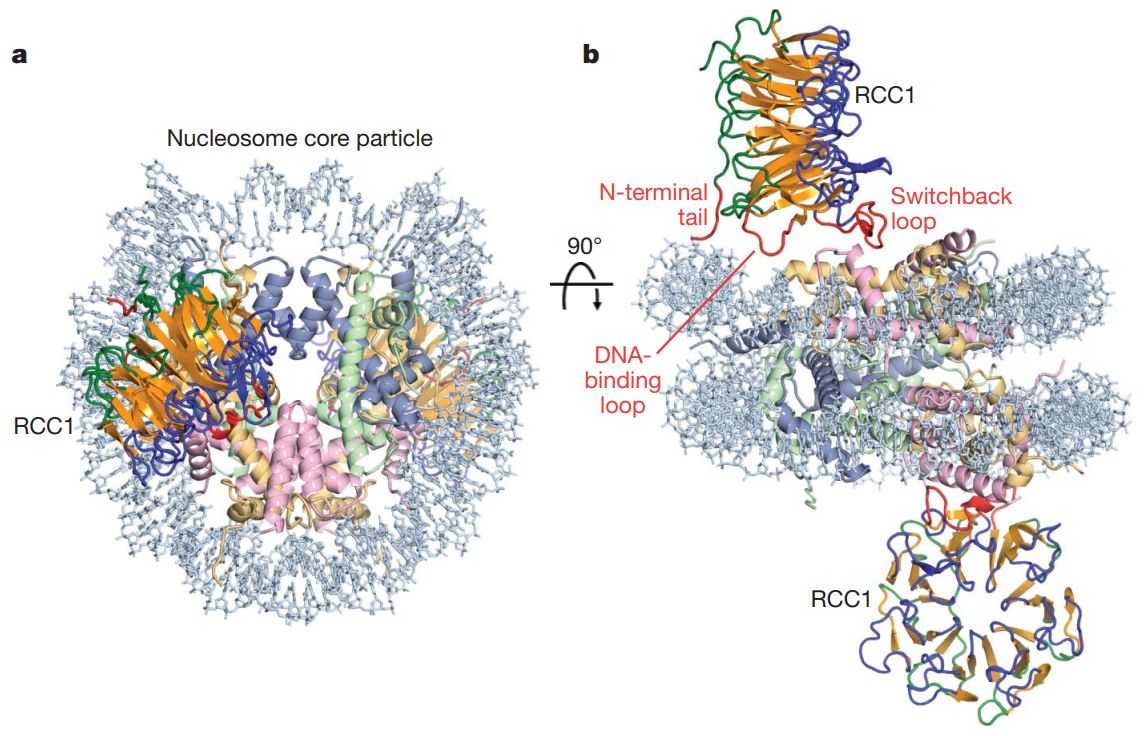What is RCC1 Protein
What is RCC1 Protein?
The RCC1 protein, encoded by the RCC1 gene, is a cornerstone of cellular machinery primarily localized in the nucleus. Serving as a critical regulator of chromosome condensation, RCC1 plays a pivotal role during the cell cycle, influencing key events such as nucleocytoplasmic transport and mitosis. At its core, RCC1 acts as a guanine nucleotide exchange factor (GEF) for the small GTPase Ran, facilitating the dynamic interchange between the GDP-bound and GTP-bound forms of Ran.

Figure 1. Crystal structure of RCC1–nucleosome core particle complex. (Makde, R., et al. 2010)
The Function of RCC1 Protein
The central function of RCC1 revolves around its role in nucleocytoplasmic transport and cell cycle regulation. During interphase, RCC1 maintains a delicate balance of Ran-GTP and Ran-GDP, crucial for precise nuclear transport. This function ensures the controlled movement of proteins and RNA molecules between the nucleus and cytoplasm.
In mitosis, RCC1 coordinates chromosome condensation, which is critical for accurate segregation during cell division. By promoting the assembly of the mitotic spindle, RCC1 ensures the faithful distribution of genetic material to daughter cells, safeguarding genomic integrity.
RCC1-Related Diseases
Dysregulation of RCC1 has profound implications for human health, particularly in the context of cancer. Altered expression or activity of RCC1 has been linked to uncontrolled cell proliferation and genomic instability, both hallmark features of cancer cells. Furthermore, mutations in the RCC1 gene contribute to chromosomal instability syndromes, shedding light on the genetic disorders associated with RCC1 dysfunction.
RCC1 Related Signaling Pathways
The signaling pathway involving RCC1 is a finely tuned mechanism crucial for cellular homeostasis. At the heart of this pathway is the interaction between RCC1 and the small GTPase Ran. RCC1, acting as a GEF, facilitates the exchange of GDP for GTP, leading to the activation of Ran-GTP.
During interphase, the Ran-GTP gradient generated by RCC1 directs nucleocytoplasmic transport with precision. This ensures that cellular components are delivered to their designated compartments in a regulated manner. In mitosis, RCC1's role becomes paramount as it locally activates Ran-GTP, contributing to the formation of the mitotic spindle essential for proper chromosome segregation.
Applications of RCC1 in Biomedical Research
The profound understanding of RCC1's molecular intricacies has paved the way for promising applications in biomedicine.
- Cancer Therapy
RCC1 emerges as a potential target for cancer therapy. Its pivotal role in cell cycle regulation and chromosome segregation makes it an attractive candidate for disrupting the uncontrolled proliferation of cancer cells. Targeting RCC1 or its downstream signaling pathways offers a precise and potentially less toxic approach to cancer treatment.
- Genetic Disorders
In the realm of genetic disorders associated with chromosomal instability, RCC1 presents itself as a focal point for therapeutic interventions. Strategies aimed at modulating RCC1 activity or compensating for its dysfunction hold promise for treating conditions arising from chromosomal abnormalities.
- Nucleocytoplasmic Transport Modulation
RCC1's influence on nucleocytoplasmic transport opens avenues for therapeutic manipulation. Researchers are exploring ways to modulate this process for targeted delivery of therapeutic agents to specific cellular compartments. This approach holds potential for precision medicine and more effective treatments.
- Cell Cycle Regulation
The central role of RCC1 in cell cycle regulation positions it as a key player in controlling cell proliferation. Insights into RCC1's involvement in the cell cycle provide a foundation for developing therapies that can halt uncontrolled cell division in diseases such as cancer. Targeting RCC1 offers a strategic approach to intervene in the progression of various disorders.
The RCC1 protein, with its multifaceted roles in cellular dynamics, emerges as a focal point for understanding and manipulating critical cellular processes. The applications of RCC1 in cancer therapy, genetic disorder treatments, and the modulation of cellular processes underscore its potential as a transformative force in the ever-evolving landscape of biomedicine.
Recommended Products for RCC1 Protein
| Cat.# | Species | Product name | Source (Host) | Tag |
|---|---|---|---|---|
| RCC1-1139H | Human | Recombinant Human Regulator Of Chromosome Condensation 1 | E.coli | N/A |
| RCC1-2229H | Human | Recombinant Human RCC1, GST-tagged | E.coli | GST |
| RCC1-1340H | Human | Recombinant Human RCC1 Protein, Myc/DDK-tagged, C13 and N15-labeled | HEK293T | Myc/DDK |
| RCC1-01H | Human | Recombinant Human RCC1 protein, His-tagged | E. coli | His |
| RCC1-2204H | Human | Recombinant Human RCC1 Protein, Myc/DDK-tagged, C13 and N15-labeled | HEK293T | Myc/DDK |
| RCC1-1868H | Human | Recombinant Human RCC1 Protein, His (Fc)-Avi-tagged | HEK293 | His (Fc)-Avi |
| RCC1-738HFL | Human | Recombinant Full Length Human RCC1 Protein, C-Flag-tagged | Mammalian cells | Flag |
| Rcc1-019M | Mouse | Recombinant Mouse Rcc1 Protein, MYC/DDK-tagged | HEK293T | MYC/DDK |
| RCC1-12391Z | Zebrafish | Recombinant Zebrafish RCC1 | Mammalian Cell | His |
Reference
- Makde, R., et al. Structure of RCC1 chromatin factor bound to the nucleosome core particle. Nature. 2010, 467, 562–566.

